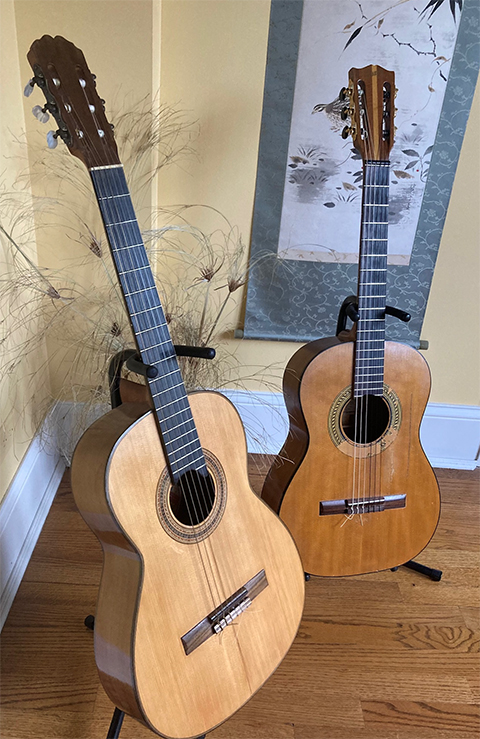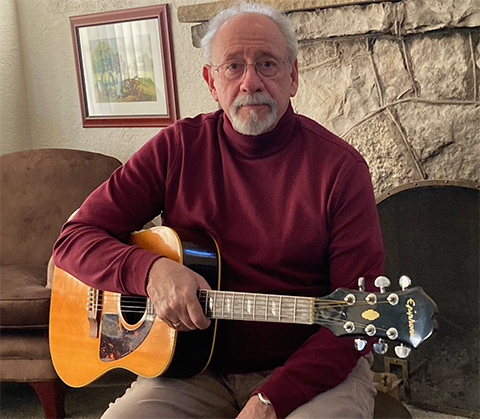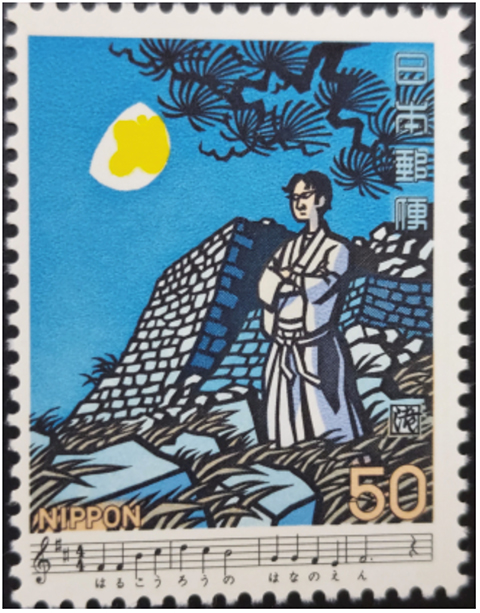My guitar companion
The folk music revival of the 1960s gave me a great gift: I became held in thrall by the acoustic guitar.
I had no real passions during high school until I got a guitar. Then I couldn't stop. I spent hours every day learning and playing songs by Bob Dylan, Joan Baez, Doc Watson and Pete Seeger. By the time I went off to college, I was proficient at bluegrass, blues and folk — enough to be invited to join a moneymaking rock and rhythm & blues band. This was a huge ego booster for a freshman, and I became flush with cash.

After college, I continued playing, but by then I had only a couple of guitar-playing friends. Over the years my playing was mostly a solitary activity. Life came along — grad school, home, family, kids and a demanding career. My guitar playing faded into the background but I never abandoned it. It was always there, like an old friend — a companion.
When my children were grown and gone, I went back to the guitar. I decided to improve my playing and explore new musical challenges. I had always loved the rock 'n roll of the 1950s and early 1960s. I began learning some of these songs and making my own arrangements, solo instrumentals capturing the melody (no singing).
While on this path, I noticed something I'd forgotten. Many early rockers had their roots in American gospel music and hymns; they spent their youth soaking up church music in the South. Little Richard, Jerry Lee Lewis and Elvis Presley all recorded classic gospel songs they’d heard on Sundays. Blues legend B.B. King recorded a gospel album early in his career. I began learning some of these songs and learning about the history of classic gospel music in America. That history is especially rich in Black culture. And it is rich in its influence on American rock 'n roll and blues. This music has stood the test of time. On YouTube, you can find Jerry Lee Lewis performing "Life is Like a Mountain Railroad" — a beautiful melody written in the early 1900s and still performed today.
Around this time, I got involved with the Old School of Folk Music in Chicago. Founded in 1957, the school holds iconic status in the teaching and performing of folk and traditional music. I asked to teach some of my arrangements of classic rock and gospel songs.
Over the next dozen years, I taught workshop classes for adults on how to fingerpick the songs that I had arranged. I enjoyed sharing my music and its history with the students, and this was a good spur to move forward musically. Besides teaching, I also learned at the Old Town School.

I joined a Mexican mariachi ensemble group that met weekly at this school, opening a new musical world for me. The group needed a vihuela player. I bought one of these Mexican stringed instruments, similar to a guitar, and learned it well enough to get by. The songs of mariachi have beautiful flowing, lilting and soaring melodies. I felt uplifted playing with the group. I met interesting new people and immersed myself in the songs of the revered Mexican composer Augustin Lara. I worked out my own solo arrangements of many of these songs and taught them in my classes.
Several years before I brought my guitar out of stagnation, I’d made a couple of business trips to Japan. I became fascinated by Japanese culture, but it took a while for this interest to include Japanese music. Years later, during my involvement with the Old Town School, I decided to see if traditional Japanese folk songs could be adapted to the guitar. Again, a whole new world.
I became interested in songs from the 1800s and early 1900s written to be played on Japanese instruments of that era, such as the three-string shamisen or the zither-like koto. Their only similarity to the guitar is strings that are plucked. After some hunting, I found two good sources of sheet music for these traditional songs. One was a website (daisyfield.com) that provided free Japanese sheet music. The library of the Japanese consulate in Chicago had a thick book of sheet music for Japanese songs dating from the 1800s. They allowed me to borrow this great resource.
Some of these songs are very simple. “Gonbe ga Tanemaku” tells of Gonbe sowing his seeds while scaring off the crows that are picking up his seeds as he sows them. “Koito-Utatote” is a simple haunting melody that tells of a man who cannot come to the island of Sado because the waves are too high and the distance too far.

“Kojo no Tsuki,” a more elaborate song, has such a revered place in Japanese folk music that it was commemorated on a Japanese postage stamp showing the first line of melody beneath the ruins of a moonlit castle.
These songs have stood the test of time, and their melodies all sound wonderful when played on the guitar. I brought my arrangements to the Old Town School and taught them in many small classes over the years — trying to open some eyes and ears to this music.
One song turned out to have a surprising history. My wife and I enjoyed the Japanese Netflix series, "Midnight Diner." Each episode begins with a beautiful Japanese song, “Omohide” sung and accompanied by a guitar. After listening to the song many times, I noticed that it sounded a little Irish. Rather odd. I decided to learn the song. Along the way, doing background research, I found that the melody is a traditional Irish tune from 1790 about a pretty milkmaid. Japanese lyrics were added much later — a cross-cultural embrace between Ireland and Japan.
The gift from the 1960s folk revival turned out to be a life-long journey. A companion, always there. Along with giving me the joy and satisfaction of playing the guitar, it opened doors to new experiences and people I wouldn't have known otherwise. It led to dalliances with the music of other cultures and eras.
I still have that first guitar from 1966 and others I've gathered along the way. They are my companions.
Enjoy reading ASBMB Today?
Become a member to receive the print edition four times a year and the digital edition monthly.
Learn moreGet the latest from ASBMB Today
Enter your email address, and we’ll send you a weekly email with recent articles, interviews and more.
Latest in Opinions
Opinions highlights or most popular articles

Women’s health cannot leave rare diseases behind
A physician living with lymphangioleiomyomatosis and a basic scientist explain why patient-driven, trial-ready research is essential to turning momentum into meaningful progress.

Making my spicy brain work for me
Researcher Reid Blanchett reflects on her journey navigating mental health struggles through graduate school. She found a new path in bioinformatics, proving that science can be flexible, forgiving and full of second chances.

The tortoise wins: How slowing down saved my Ph.D.
Graduate student Amy Bounds reflects on how slowing down in the lab not only improved her relationship with work but also made her a more productive scientist.

How pediatric cataracts shaped my scientific journey
Undergraduate student Grace Jones shares how she transformed her childhood cataract diagnosis into a scientific purpose. She explores how biochemistry can bring a clearer vision to others, and how personal history can shape discovery.

Debugging my code and teaching with ChatGPT
AI tools like ChatGPT have changed the way an assistant professor teaches and does research. But, he asserts that real growth still comes from struggle, and educators must help students use AI wisely — as scaffolds, not shortcuts.

AI in the lab: The power of smarter questions
An assistant professor discusses AI's evolution from a buzzword to a trusted research partner. It helps streamline reviews, troubleshoot code, save time and spark ideas, but its success relies on combining AI with expertise and critical thinking.

